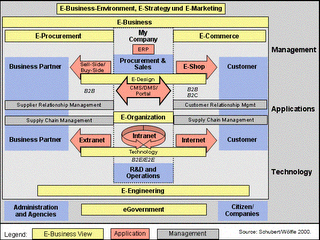On e-Commerce & e-Business
E-Commerce is not e-Business, and e-Business is not (only) e-Commerce. Everyday I realize as I discuss with people that the the trend goes towards mixing the two concepts every day more.
* E-Commerce is synonym to allowing e-Shopping: an e-Commerce platform (be it C-to-C or B-to-C) is basically a virtual, interactive shop window that make products and services available to all cyber-citizens.
* E-Business has a broader range: as I see it, e-Business incures major transformations in traditional ways of doing business.
E-Business is about getting rid of resources-costly processes through integrated information systems.
These information systems (ERP software + electronic terminals) usually involve sourcing (SRM: Supplier Relationship Management), tracking inventory and goods (e-Supply Chain), managing talents (e-HR), finance, customer needs (CRM) to make their shopping experience better and better - and..e-Commerce, which, because it allows direct interactions with customers, is the most important part as long as operations are perfectly executed.
To wind up, when e-Commerce helps the company selling (better) through electronic channels, e-Business is about enhancing a competitive advantage by bringing in information technologies into the firm´s operational processes.
Here is an excellent recapitulating chart devised by Pr. Petra Schubert from the University of Applied Sciences of Basel, Switzerland:
 You may find the whole presentation (.pdf) by clicking here. The lecture was given in December 2005 at an e-Commerce conference in Lisboa, Portugal.
You may find the whole presentation (.pdf) by clicking here. The lecture was given in December 2005 at an e-Commerce conference in Lisboa, Portugal.
* E-Commerce is synonym to allowing e-Shopping: an e-Commerce platform (be it C-to-C or B-to-C) is basically a virtual, interactive shop window that make products and services available to all cyber-citizens.
* E-Business has a broader range: as I see it, e-Business incures major transformations in traditional ways of doing business.
E-Business is about getting rid of resources-costly processes through integrated information systems.
These information systems (ERP software + electronic terminals) usually involve sourcing (SRM: Supplier Relationship Management), tracking inventory and goods (e-Supply Chain), managing talents (e-HR), finance, customer needs (CRM) to make their shopping experience better and better - and..e-Commerce, which, because it allows direct interactions with customers, is the most important part as long as operations are perfectly executed.
To wind up, when e-Commerce helps the company selling (better) through electronic channels, e-Business is about enhancing a competitive advantage by bringing in information technologies into the firm´s operational processes.
Here is an excellent recapitulating chart devised by Pr. Petra Schubert from the University of Applied Sciences of Basel, Switzerland:
 You may find the whole presentation (.pdf) by clicking here. The lecture was given in December 2005 at an e-Commerce conference in Lisboa, Portugal.
You may find the whole presentation (.pdf) by clicking here. The lecture was given in December 2005 at an e-Commerce conference in Lisboa, Portugal.

0 Comments:
Post a Comment
<< Home